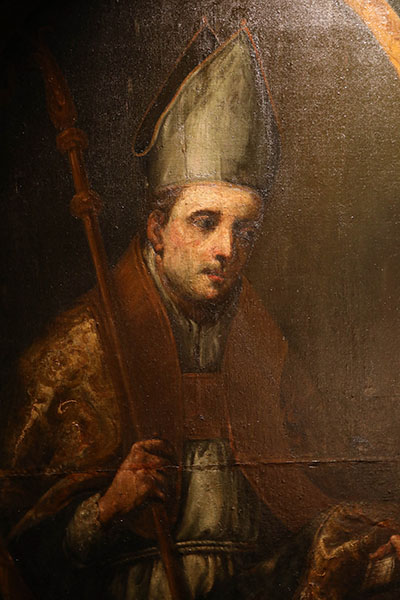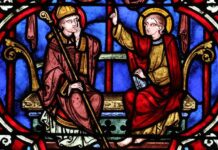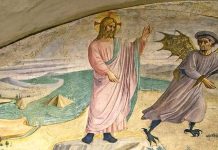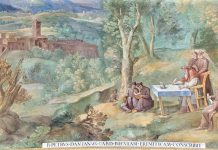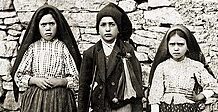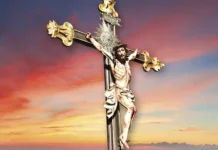Thursday of the Fourth Week of Lent
Featured Saints

St. Cyril of Jerusalem, bishop and Doctor of the Church (†c. 386 Jerusalem). Optional Memorial. An outstanding catechist and educator in the Faith. He was persecuted by the Arians for his part in their condemnation as heretics, along with the Macedonians.
St. Anselm of Lucca, bishop (†1086). Governed the Church of Lucca, Italy, remaining faithful to the Roman See regarding the investiture question. Pope St. Gregory VII sent him as Pontifical Legate to Lombardy.
St. Braulio, bishop (†651). Disciple and friend of St. Isidore of Seville, appointed Bishop of Zaragoza, Spain. He helped his teacher to restore ecclesiastical discipline throughout all of Hispania, particularly by opposing the Arian heresy which still persisted in that region.
St. Salvator Grionesos of Horta, religious (†1567). At age twenty he entered the Franciscan convent of Barcelona, Spain. He suffered the misjudgement and persecution of his confreres because of his gift of miracles.
St. Alexander of Jerusalem, bishop and martyr (†circa 250). He created a precious library in the Holy City and founded a school. He was martyred at an advanced age for refusing to renounce the Faith.–
St. Fridianus, bishop (†c. 588). Native of Ireland, he gathered a community of monks in Lucca, Italy, diverted the course of the Serchio River, to cultivate the land, and converted the Lombards to the Catholic Faith.
St. Edward II, king (+978). Baptized by St. Dunstan, whose guidance he followed as he assumed the throne of England at the age of 13 at the death of his father, King Edgar. He was assassinated only a few years later in a conspiracy to seize the throne.
Blessed Martha Le Bouteiller, virgin (†1883). Religious from the Sisters of the Christians Schools of Mercy, she lived in the monastery of Saint-Sauveur-le-Vicomte, France, dedicating herself to the humblest offices.
Blessed Celestina of the Mother of God, virgin (†1925). Founded the Congregation of the Daughters of the Poor of St. Joseph of Calasanz in Florence, Italy.
Mass Readings
First Reading – Ex 32:7-14
The LORD said to Moses, “Go down at once to your people whom you brought out of the land of Egypt, for they have become depraved. They have soon turned aside from the way I pointed out to them, making for themselves a molten calf and worshiping it, sacrificing to it and crying out, ‘This is your God, O Israel, who brought you out of the land of Egypt!’ The LORD said to Moses,
“I see how stiff-necked this people is. Let me alone, then, that my wrath may blaze up against them to consume them. Then I will make of you a great nation.”
But Moses implored the LORD, his God, saying, “Why, O LORD, should your wrath blaze up against your own people, whom You brought out of the land of Egypt with such great power and with so strong a hand? Why should the Egyptians say, ‘With evil intent He brought them out, that He might kill them in the mountains and exterminate them from the face of the earth’? Let your blazing wrath die down; relent in punishing your people. Remember your servants Abraham, Isaac and Israel, and how You swore to them by your own self, saying, ‘I will make your descendants as numerous as the stars in the sky; and all this land that I promised, I will give your descendants as their perpetual heritage.’“ So the LORD relented in the punishment He had threatened to inflict on his people.
Responsorial Psalm – Ps 106:19-20, 21-22, 23 (R. 4a)
R. Remember us, O Lord, as you favor your people.
Our fathers made a calf in Horeb
and adored a molten image;
They exchanged their glory
for the image of a grass-eating bullock. R.
They forgot the God who had saved them,
who had done great deeds in Egypt,
Wondrous deeds in the land of Ham,
terrible things at the Red Sea. R.
Then He spoke of exterminating them,
but Moses, his chosen one,
Withstood Him in the breach
to turn back his destructive wrath. R.
Gospel – Jn 5:31-47
Jesus said to the Jews:
“If I testify on my own behalf, my testimony is not true.
But there is another who testifies on my behalf,
and I know that the testimony he gives on my behalf is true.
You sent emissaries to John, and he testified to the truth.
I do not accept human testimony,
but I say this so that you may be saved.
He was a burning and shining lamp,
and for a while you were content to rejoice in his light.
But I have testimony greater than John’s.
The works that the Father gave Me to accomplish,
these works that I perform testify on my behalf
that the Father has sent Me.
Moreover, the Father who sent Me has testified on my behalf.
But you have never heard his voice nor seen his form,
and you do not have his word remaining in you,
because you do not believe in the one whom he has sent.
You search the Scriptures,
because you think you have eternal life through them;
even they testify on my behalf.
But you do not want to come to me to have life.
“I do not accept human praise;
moreover, I know that you do not have the love of God in you.
I came in the name of my Father,
but you do not accept Me;
yet if another comes in his own name,
you will accept Him.
How can you believe, when you accept praise from one another
and do not seek the praise that comes from the only God?
Do not think that I will accuse you before the Father:
the one who will accuse you is Moses,
in whom you have placed your hope.
For if you had believed Moses,
you would have believed Me,
because he wrote about Me.
But if you do not believe his writings,
how will you believe my words?”







